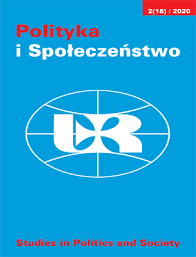NOWY KIERUNEK BADAŃ EWOLUCJI MODELI SAMORZĄDU TERYTORIALNEGO W NIEMCZECH Z PERSPEKTYWY PROCESU KOMUNALIZACJI I DEKOMUNALIZACJI
DOI:
https://doi.org/10.15584/polispol.2020.2.7Słowa kluczowe:
self-government in Germany, municipal government in Germany, county self-government in Germany, communalization, de-communalizationAbstrakt
The aim of the article is to indicate a new direction of research on the evolution of system models of local self-government in Germany in the perspective of communalization and de-communalization. Communalization can be used to explain legal regulations of a local government, which are similar to the South German model and, on the other hand, to explain how analogous regulations that strengthen the role of the legislative body, both in the municipal self-government and in the county self-government, function in the same federal states. De-communalization enables to investigate the role of starosta (Starost) in the organizational structure of county self-government. The core result of the study is the fact that on the basis of the three research criteria (geographic, historic, and the range of relations between legislative and executive bodies) the process of communalization of municipal self-governments and county self-governments in 11 federal states has been duly corroborated.
Pobrania
Opublikowane
Jak cytować
Numer
Dział
Licencja

Utwór dostępny jest na licencji Creative Commons Uznanie autorstwa – Na tych samych warunkach 4.0 Miedzynarodowe.


